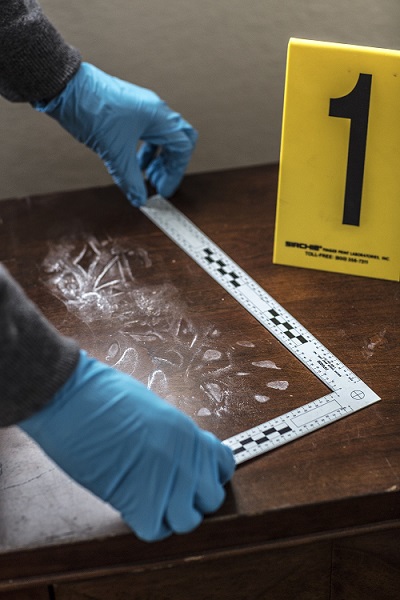The Forensic Science Bachelor's Degree Program offers two separate emphases for students to tailor their education according to their career goals and the demand of the forensic science community. One emphasis, Forensic Laboratory, focuses on the laboratory environment, which can lead to a career as a criminalist in a crime laboratory. The second emphasis, Forensic Investigation, focuses on working in the field, which can lead to a career such as a crime scene investigator.
Beginning Fall 2023, we will be implementing an application process for our Bachelors of Forensic Science Degree. For any student wishing to matriculate into the BS degree, you will need to meet all pre-requisites and deadlines listed on our Admissions page. If you have not met these requirements, you will need to enroll in the AS of Forensic Science degree program, which will provide you with the appropriate course completions needed to apply.

The Associate of Science in Forensic Science (ASFS) is designed to provide a preparatory educational path for students who are seeking acceptance into UVU's Bachelor of Science in Forensic Science (BSFS) degree program. The ASFS degree allows for completion of all general education, foundational science, math and criminal justice courses needed in order to apply for matriculation into the BS program. This degree will additionally provide a completion point for students who do not wish to pursue a bachelor's degree, or facilitate transfer to another institution for a bachelor's degree completion elsewhere. The AS Degree requirements can be found here: Degree Requirements
Students learn basic principles in science and math, which are preparatory to foundational skills within forensic science. Additionally, students will learn aspects of criminal justice, criminal law and how forensic science applies within criminal investigations.
Program Learning Outcomes
The Forensic Laboratory emphasis provides students with a comprehensive science-based undergraduate education, which enables students to enter into a forensic science career. Students learn the necessary technical and theoretical knowledge, skills, and abilities of modern forensic techniques. By employing the theoretical and practical principles of chemistry, biology, physics, and mathematics, students will perform forensic science work commonly conducted within a crime laboratory.
Science-based study and application of these principles expose students to a stimulating academic environment conducive to scholarly inquiry. Students gain the knowledge and ability for research-based projects and for potential improvement of the forensic community. Throughout this program, students develop and employ effective written and oral communication skills required of forensic experts, as well as demonstrate work ethic, professional demeanor, reliability, and proper interpersonal skills.


The Forensic Investigation emphasis provides an interdisciplinary program that prepares students for public, state, and federal careers with needed forensic investigation subject matter expertise and analytical skills. Students are exposed to the wide variety of critically important forensic investigation techniques, which are currently practiced by various forensic service providers and law enforcement agencies today.
Students learn techniques such as the identification and proper collection of evidence found at crime scenes, accurate crime scene documentation skills, forensic photography, death investigations, fingerprint processing/examinations, impression evidence/examination, bloodstain pattern analysis, crime scene reconstruction, firearms and tool mark evidence/examination. Students acquire skills such as critical thinking, writing, expert testimony, and analysis techniques specifically tailored for forensic investigation fieldwork. This emphasis provides students with the overall professional skills, work ethic, and demeanor required of forensic investigators.
UVU offers a wide range of courses in forensic science. Course offerings include:
| Course Number | Course Name |
| CJ 1350 | Introduction to Forensic Science |
| FSCI 3300 | Forensic Photography |
| FSCI 3400 | Criminalistics |
| FSCI 3500 | Footwear and Tire Mark Evidence Examination |
| FSCI 3540 | Forensic Trace Analysis |
| FSCI 3600 | Forensic Anthropology |
| FSCI 3700 | Fingerprint Processing |
| FSCI 3720 | Fingerprint Examination |
| FSCI 3780 | Bloodstain Pattern Analysis |
| FSCI 3820 | Crime Scene Investigation Techniques I |
| FSCI 3830 | Complex Scene Analysis and Reconstruction |
| FSCI 3850 | Marijuana Identification Certificate |
| FSCI 3860 | Forensic Microscopy |
| FSCI 3870 | Digital Evidence in Forensic Investigations |
| FSCI 3880 | Forensic Expert/Professional Practices and the Legal System |
| FSCI 4000 | Firearms Examination |
| FSCI 4050 | Forensic Approaches to Cold Case Investigations |
| FSCI 4100 | Forensic Pathology |
| FSCI 4200 | Medicolegal Death Investigations |
| FSCI 4300 | Forensic Genealogy |
| FSCI 4320 | Genealogy Research Methods and Standards |
| FSCI 4350 | Forensic Genealogy Seminar |
| FSCI 4450 | Forensic Serology |
| FSCI 443R | Directed Research in Forensic Science |
| FSCI 4500 | Forensic Drug Chemistry and Toxicology |
| FSCI 4600 | Forensic DNA Analysis |
| FSCI 475R | Current Topics in Forensic Science |
| FSCI 481R | Forensic Science Internship |
| FSCI 489R | Research in Forensic Investigations |
| FSCI 491R | Directed Readings & Special Projects |
| FSCI 4990 | Forensic Investigation Capstone |